What would you need in an old car to make it a practical driver? It would need to be cheap, of course, dependable, get decent fuel mileage and be fun to drive. A cheap driver is likely to have too many doors, bad paint and a well worn interior. This Rabbit listed here on craigslist is overpriced, but nicer than most. It could be a candidate especially if you are a fan German engineering. This Rabbit was hiding in a barn for awhile and has a little over 80,000 miles showing. The seller is asking $4,000 but $2,500 seems more realistic to me. It needs minimal work, just charge the A/C and fix the headliner. It gets great fuel mileage and they are fun to drive. It’s only got 48 horsepower at best, but this is a very light car and with it’s manual transmission it does alright.
The interior could look pretty nice with a good cleaning. The actual color is red without the orange hue.
You can really see the failing paint from here but the tail lights are not faded. The years in a barn likely saved this bunny from more sun damage. I’ve had several of these little diesels and the engines are very reliable. If you could get this for about $2,500, wouldn’t it make a fun little driver?





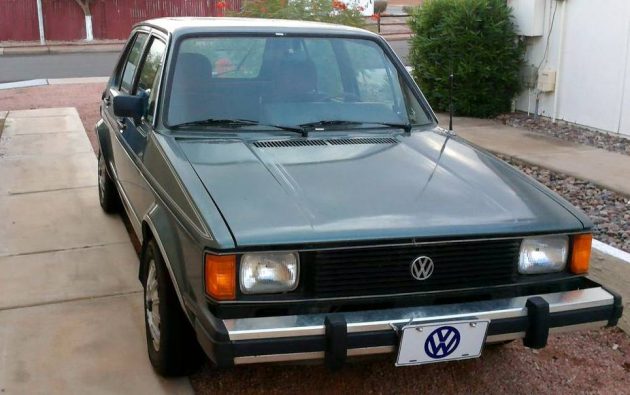
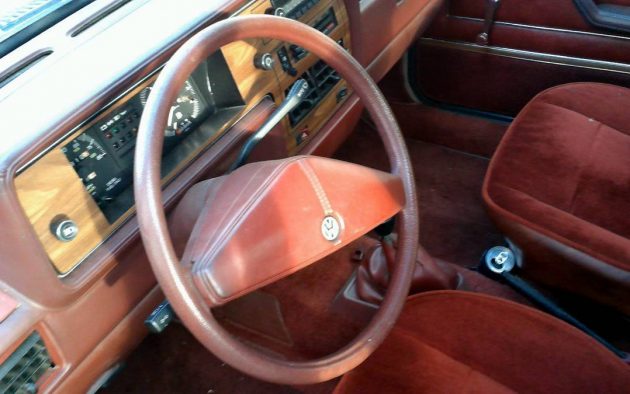
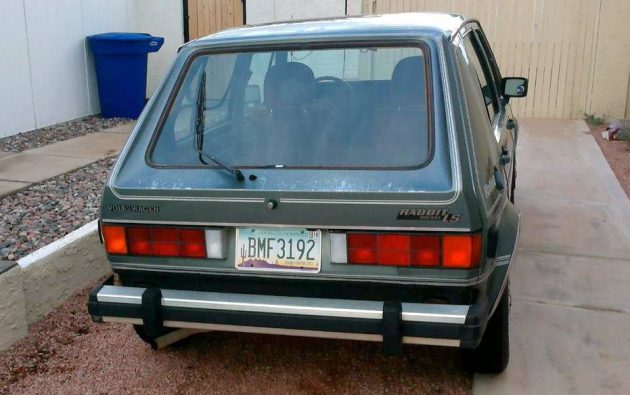
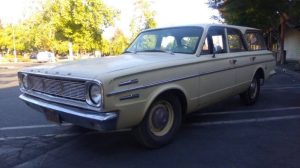
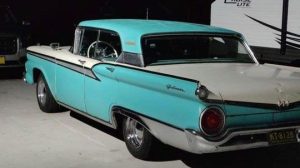
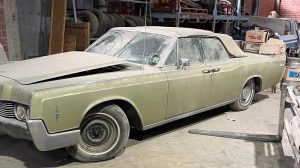
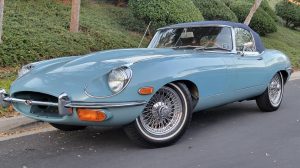


If its a 4- speed then drive it at 55, if a5-speed then drive it 70 to get optimum fuel economy. A friend had both and that is what he found. Always wanted a diesel rabbit pickup!
That is not true……VW used several final drive ratios with both 4 and 5 speed transmissions. Some 4 speeds had the same final drive as the highest 5 speeds did. When I bought my Diesel pickup, it was nearly new. I asked the dealer about the advantages of one over the other, he claimed the 4 speed was a more robust trans and had the same final drive ratio as the 5 speed. In my studies over the years I have confirmed that. Like a Porsche 930 that never came with a 5 speed because the engine torque is too high.
Always wanted to do a greasecar conversion to one of these.
Are these a non – turbo type diesel engine ? I’m guessing @ 48 hp they are NOT turbo
Non-turbo engine. Reasonable around town, but rather unpleasant on the highway -at least with the 4-speed.
Diesel Rabbit = the one car I had the most mercurial Love/Hate relationship with.
Loved the fuel economy, and it was ok to drive, at WOT on the freeway.
Hated the reliability, done in by a leaking windshield (onto the electrical connections box) and subsequent overheat/blown head gasket.
Was happy to just have someone come and tow it away. Good riddance.
That windshield leak is what did my Rabbit in as well.
’87 Cabrio (Gasser) suffering the same fate.
My parents purchased a brand new one in 1981 when we were in Germany. Bought it back to the states in ’83. I drove it before getting my first car and kept track of MPG in a book. We got 50 mpg on the highway and low 40’s in town. Great car when I weighed 165 lbs in high school but a little cramped now that I am almost 50.
overpriced, this is about what it cost new-
Fun? No, anything with four doors and no power windows is a pita these days past 50 yrs old. I like to roll windows down a lot and this would not work having to pull over every time.
Also these cars were very utilitarian basic transportation and add in the stink factor it’s not fun at all. If u live in the city and need to get from point a to b efficiently then yes, but these were not pleasant road cars at all.
I had an ’81 Rabbit LS Diesel with the 4-speed manual also. It was a 2-door, but with the same red interior. Odd seatbelt configuration – shoulder belt only, attached to the door, knee pads under the dashboard instead of a lap belt.
Off the line, it felt reasonably quick by 1980’s standards. Couldn’t maintain highway speed going uphill – kind of a problem in the hilly Northeast. Really good mileage though – great for a college student.
Very unlikely the A/C “just needs a recharge,” and getting parts might be a challenge 35 years later. Still, it would probably be a fun around town kind of car as long as the weather wasn’t too hot.
I like diesels…in principle. And I have owned them. Just not VW diesels.
These Rabbit diesels were very basic and crude. A neighbor up the street owned one and you knew every time he went past the house because the clatter was so loud you could hear it through the walls.
You had to be committed to VW or Rabbits or cheap-diesel-at-all-costs to own one of these, and I never was.
And with the supremely arrogant Ferdinand Piech who decreed that VW GROUP would become the world’s largest carmaker, with all of the lies and deception that led to, my 1962 Beetle owned decades ago will be the first and last VW I will ever own.
Looks like a nice car. Simple and cheap transportation for at least another 100,000 miles. Figuring cost per mile in depreciation this is still a bargain at $4000. Put historic tags on it to skip emissions and roll coal :)
We an 83 Diesel Pickup with a cap and loved it. It was the perfect truck for my wife, small but with a decent cargo capacity. With the small cab the A/C kept it like a meat locker. We drove it to a rusty death at about 240,000 miles. I retired it due to safety concerns after two decades of rust made me think it would collapse or fall apart in a collision. It was great for hauling smaller stuff that didn’t require my gas guzzling full size truck. Mileage was good but it never topped 39 MPG, most likely due to the increased drag caused by the cap.
Good cars overall. A lot of people owned them who shouldn’t have. I think they saw a sticker on top of the battery that read: Maintenance Free, and felt that applied to the whole vehicle. Or there were some who got the timing belt too tight and wore the bushings out in the injection pump. Still the absolutely WORST thing you could do with one of these is let them run out of diesel fuel. Scratch (1) injection pump…
Not overpriced at all. values for Early Rabbit are climbing especially Diesels. I just sent this one to Germany at a much
jeff
I had a ’77 with the 4 speed for a couple years and always wanted to put a 5 speed in it. Not sure what RPM it was turning but it sure sounded like I ought to have another gear. Got great mileage but the short freeway onramps on my commute made for some white-knuckle merging
I have had several of these, including a pickup and a few rabbits. For their day, they were fine on the hi way. Curious thing, if you want a car with power windows that drives like a contempory car, what are you doing on here? Really, an old car with power windows?
My neighbor drove one of those Rabbit diesels years ago, god did I hate that thing. So loud and stinky. Yes, you could hear whenever he left for work and then came home later that day. Slow? I’ve seen glaciers move faster. nO tHanKs jeFF.
In hilly country, always had to turn off the A/C to go uphill at a decent speed
They were known for blown head gaskets. When the head was milled to make it flat again, a thicker replacement gasket had to be used to make up what was milled off the head to keep the compression the same. Used “torque to yield” head bolts that had to be replaced also. Many shops were not familiar with this and the cars never were reliable afterwords.
I wonder if VW’s diesels were prone to blown head gaskets because they were a converted gas motor (like General Motor’s 5.7L).
I owned a 1981 Isuzu I-Mark diesel (5speed) that would get nearly 50mpg and was exceedingly reliable. It was also exceedingly slow! At the time, Isuzu was second only to Daimler Benz in worldwide diesel production (Isuzu’s were primarily marine and trucks).
The VW diesel was designed and built as a diesel; it was NOT a converted gas motor. The head gasket problems were typical of using a cast iron block and an aluminum head; they just had to design something that worked with the two different metals and their expansion/contraction characteristics.
Now to clear up another myth: The GM/Oldsmobile 350/5.7 was NOT a converted gas motor. It was similar in size and shape but very few parts interchanged between the two. Heads totally different; block totally different; crankshaft and camshaft totally different. The rocker arms and supports were the only things I know of that were shared with the gaspots.
I think you are correct……..but some of the best gas engines were converted from Diesel……the 4 cyl Mercedes engines share blocks and many other components between gas and diesel. I have never experienced a head gasket problem with my VW diesels but it is easy to understand, the combination of 21-1 compression and the dissimilar coefficient of expansion between aluminum and iron…….one overheating episode would do the trick. I also had a Cadilac with a 5.7 diesel…..it had been recalled and repaired before I bought it but for me it was great. Never missed a beat and got 26 MPG. I am a diesel kind of guy and think many problems were operator error. There was a company ( Pathfinder ) that marinized the VW 1600 engine, they are a good size for many sail boats. They worked well with all that additional cooling but ran a bit rough with the light flywheels.
The VW 1.5L diesel was based off of VW’s 1.6L gas engine block through 1980 (the only VW diesel to do so). It was replaced by the 1.6L diesel engine in 1981.
GM’s 5.7L (350) diesel was a debacle for the company and the U.S. diesel market. They blew head gaskets usually just over 50k miles, though some did last longer. I grew up around these cars (Eldos, Toros, Delta88, etc); I found them to be very economical and easy to live with until the head gasket issue inevitably arose (cast iron heads and block). GM ceased production of diesel production in cars (both V8 and V6) by the mid-eighties because they had single-handedly destroyed the domestic diesel market. Demand for diesels in light trucks increased over time for obvious reasons (reliability and economy) but never made it back into a GM car yet. BTW, the Chevy Luv and Chevette diesels were made by Isuzu and were real diesels, thus extremely reliable and economical.
Hi Bryan. I see I can stand corrected on the VW motor. I had understood that it was designed as a diesel from the get-go. There were a few that made their way through our shop but most of them were either bad timing belts or had been allowed to run out of diesel fuel at highway speed which caused the vane-type feed pump inside the drive end of the injection pump to run dry, the vanes carving their way into the housing. They’d get the car running again and about all it was good for was killing mosquitos.
I have to disagree with you on the Olds 350 diesels to some extent. I worked for a GM dealership from their introduction in the fall of ’77 until our shop closed in ’84, afterwhich I went exclusively into the diesel service business which I’m still involved with today. The 350 diesel was the most misunderstood engine GM ever produced. When one was driven into the average service department, everyone was like the deer in the headlights; they were scared to death of it. Running rough? Replace the injection pump and injectors. When I was with the dealership I was in the parts department one day when I heard one pull up in the parking area which was about 50 yards from the entrance. I could hear a distinct pop-pop-pop through the intake indicating that an exhaust valve wasn’t opening. The customer came in looking for the service department. I introduced myself and said: “Sounds like you’ve got a bad rocker arm.” The guy was incredulous. Two reputable dealers had each replaced the injection pump and injectors. Now when a gas pot pops back through the intake, a capable mechanic will check out the valve train. Why was it when a diesel motor did the same thing, the same mechanic replaced the injection system? That was the kind of stuff that went through more service departments than you’d care to believe.
Consumers flocked after the 350 diesels because they got good fuel economy but half of them should’ve stayed with gaspots because stop and go operation didn’t do the diesels any favors. Service departments simply missed the boat with diagnosis and repairs. The boys at Lansing actually wanted to make it a bit heavier but they were fighting with weight limits imposed upon all domestic makers at that time so their hands were tied. Finally, the reason the 350 was dropped in the mid-80s was that the gas pots with EFI were every bit as economical as the diesel was by then. No more smelly exhaust and smoking up the garage when you started it up either. Anyways, that’s the way I looked at the 350. I’ve still got some customers running them, some well past the 400K mile mark. I’ve got one customer that adapted one to pump water for his 1/4 mile irrigation system. I converted the injection pump to a constant speed governor and he’s put 5,000 hours on it last count…
I had one of these… 1982, white with blue interior. Thermostat locked on me on a trip in the middle of winter. As soon as I saw that it was overheated, I cut the engine… The block cracked.